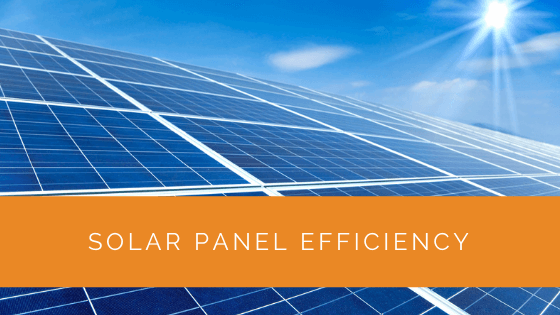Solar panel adoption for energy generation has been increasing in recent years. Solar power has become a significant contributor to the UK’s energy mix, highlighting its importance as a renewable energy source. Some benefits of solar energy include increased energy self-sufficiency, reduced electricity expenses, and a smaller environmental footprint.
One notable advantage of solar energy is its renewability, which ensures a long-term energy source without depletion concerns. If you are considering installing solar panels on your property, it is essential to assess their efficiency. Efficient solar panels are critical for maximizing electricity production and cost savings over time.
To determine the efficiency of your solar panel system, various metrics can be used. One commonly used metric is solar cell efficiency, which measures how effectively your panels convert sunlight into electricity.
This guide explores the different aspects of solar panel efficiency. Before deciding to install solar panels, it is advisable to prioritize high efficiency and research the best available panels on the market.
Contents
- 1 Key Takeaways
- 2 What Is Solar Panel Efficiency?
- 3 Different Type of Solar Panel System
- 4 Solar Cells and Their Efficiency – At a Glance
- 5 What Are The Factors That Affect The Solar Panel Efficiency?
- 6 How Can You Increase Your Solar System Efficiency?
- 7 Why Do You Need Efficient Solar Panels?
- 8 What Should Solar Shoppers Look For When Choosing Solar Panels?
- 9 Discover the Power of Solar with Solar Panels Network
- 10 Summing Up
Key Takeaways
- Solar panel efficiency is crucial for energy independence, lower electricity bills, and reduced carbon footprint.
- Solar panel efficiency is measured by converting sunlight into electricity under Standard Test Conditions (STC).
- There are three main types of solar panels: monocrystalline, polycrystalline, and thin-film, each with varying levels of efficiency.
What Is Solar Panel Efficiency?
Solar panel efficiency is the metric used to measure the conversion of sunlight into electricity. The solar panels need to be directly exposed to a lot of sunlight for conversion. You can measure solar panel efficiency under Standard Test Conditions STC, a strictly controlled test condition.
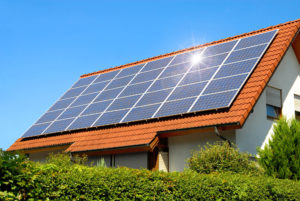 When conducting STC, the solar panel will be exposed to constant sunlight and temperature. It helps measure the voltage and current produced for multiple load resistances.
When conducting STC, the solar panel will be exposed to constant sunlight and temperature. It helps measure the voltage and current produced for multiple load resistances.
Solar panel efficiency can be determined by the maximum power rating of the solar panel at STC divided by the area of the panel in meters. The formula is –
Efficiency = ([Pmax / Area] / 1000) x 100%
Since solar panel efficiency is measured under standard test conditions STC, the real-world efficiency might be different. Several other factors come into consideration when considering the high efficiency of solar panels. These factors are –
- Reflection
- Panel age
- Shade
- Bushing and wiring
- Protective back sheeting and roof colour
- The potential solar output of the region
- Panel Installation and panel placement
- Weather
The average solar panel efficiency is measured between 15% and 20%. However, the efficiency may sometimes exceed 20% depending on the solar panel quality. The more efficient a solar panel system is, the more the homeowner can save on the electricity generated.
Different Type of Solar Panel System
Before you think about installing a solar panel system in your home, you must conduct extensive research. You need to choose a panel that can fulfil your energy requirements. Currently, you can choose from three main solar panel types in the market.
Below are the types of solar panels and their features.
Monocrystalline Silicon Solar Panels
Monocrystalline solar panels are also called single-crystalline cells made of pure silicon. The solar cells are made from long rods made into wafers. Monocrystalline cells have the highest efficiency rate at 177% to 22%.
The monocrystalline cells have more space for electron flow, making the panel very efficient. They have square-shaped wafers that seem to be pitch-black and are very eye-pleasing. However, monocrystalline solar panels are very expensive.
Polycrystalline Silicon Solar Panels
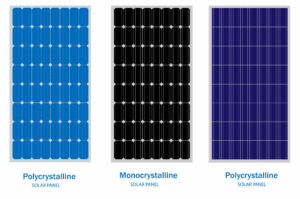 Polycrystalline solar panel systems are also called multi-crystalline panels. They are a budget-friendly choice for homeowners but have less efficiency than monocrystalline panels. The efficiency rating of polycrystalline panels is 15% to 17%.
Polycrystalline solar panel systems are also called multi-crystalline panels. They are a budget-friendly choice for homeowners but have less efficiency than monocrystalline panels. The efficiency rating of polycrystalline panels is 15% to 17%.
Polycrystalline solar is made from silicon crystals, which are then cut into the shape of wafers. These wafers are blue and help in producing PV cells. Even though they are less efficient than monocrystalline panels, their low price range makes them a favourite of homeowners.
Thin Film Solar Cell Technology
The last type of solar panel is thin-film solar cell technology, which is nothing like monocrystalline or polycrystalline panels. This solar cell technology does not have any outlines of the silicon cell. Thin-film technology uses a substrate of glass, plastic, or metal.
They are very flexible, which makes them perfect for portable or small-scale applications. Thin-film solar cell technology is also very lightweight, and its efficiency rating is around 10% to 13%.
You will find them in blue or black colours.
Solar Cells and Their Efficiency – At a Glance
You can configure solar cells to increase the efficiency of solar panels. Below are some solar cells and their efficiency ratings.
- Polycrystalline PERC – 16% to 17%
- Monocrystalline PERC – 17% to 19%
- Shingled Monocrystalline – 18 % to 20%
- Half-Cut Monocrystalline PERC – 18% to 20%
- Half-Cut Monocrystalline PERC MBB – 19% to 20.5%
- Shingled Monocrystalline PERC – 19% to 20.5%
- Half-Cut MBB Heterojunction – 20% to 22%
- N-Type IBC – 20% to 23%
The above solar cell types have certain abbreviations we have explained below for better understanding.
PERC – Passivated Emitter and Rear Cells
PERC reduces the electrons’ tendency to recombine by reflecting the solar power into the solar cells. They also absorb high wavelengths from the sunlight and offer a higher efficiency rating than traditional ones.
MBB – Multiple Busbars
MBB reduces current loss by reducing the current flow rate through the cell wafer.
IBC – Interdigitated Back Contact
The cell’s front absorbs the sunlight, whereas the conversion occurs at the back. MBB is highly reliable and has great efficiency and yield.
What Are The Factors That Affect The Solar Panel Efficiency?
Solar panels are a crucial energy source, with several factors affecting their efficiency in the real world. Below are some of those factors –
Material
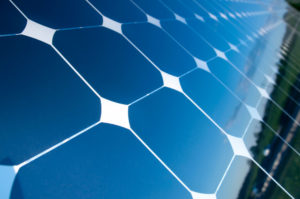 The panel material makes a huge impact on the efficiency of solar panels. These materials form the solar cells inside the solar panel system. It focuses on the solar cells, cable thickness, and wiring that occurs during the production of solar panels.
The panel material makes a huge impact on the efficiency of solar panels. These materials form the solar cells inside the solar panel system. It focuses on the solar cells, cable thickness, and wiring that occurs during the production of solar panels.
Reflectance Efficiency
Another factor that impacts solar panel efficiency is reflectance efficiency. The sunlight on the solar panel is not completely absorbed and generates electricity. Most of the sunlight is not absorbed and reflects off of the surface.
The energy output would be high if the sunlight reflected less from the surface.
Thermodynamic Efficiency
Thermodynamic efficiency refers to the solar panel’s optimal efficiency. It is the sunlight’s height that is converted into electric current. The approximate thermodynamic efficiency will be about 86%.
How Can You Increase Your Solar System Efficiency?
Solar panels have multiple solar PV systems that will collect energy from sunlight. Hence, you need to be able to increase the solar system’s efficiency after installing the system. Below are some ways to maximise solar panel efficiency in the real world.
Reduce Drivers by Understanding Your Requirements
You need to determine the number of devices you will be running on solar power. It will help you decide the number of drivers that you require. It is the best way to decide the right solar panel efficiency you require for your house.
Choose High-Quality Solar Panels
High-quality solar panels will have higher efficiency. Check for solar panel manufacturers that offer high-efficiency panels. However, going for expensive solar panels is not always an option. It would be best if you looked for options that are high in quality but not in price.
The Pitch and Angle
You can maximise the solar panel efficiency with the right angle and pitch. A solar panel can produce electricity efficiently if it receives abundant sunlight. It would only be possible when the corner and pitch of the solar panels are correct.
Getting direct sunlight might be a problem during cloudy days, so you must keep this in mind. Ensure the angle is right enough to get proper sunlight during cloudy days.
Clean Solar Panels
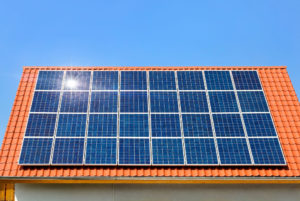 To maximise the efficiency of the solar panels, you need always to keep them clean. You should ensure there is no dirt or dust on them. If the solar panels are not clean, it could hinder their efficiency.
To maximise the efficiency of the solar panels, you need always to keep them clean. You should ensure there is no dirt or dust on them. If the solar panels are not clean, it could hinder their efficiency.
Since the solar panels are glass, cleaning them would not be too hard. Apart from dust, it would be best to clean the solar panels of snow during winter. If snow accumulates on the solar panels, it will hinder direct exposure to sunlight.
Why Do You Need Efficient Solar Panels?
It is already established that solar panel efficiency is crucial for an efficient solar PV system. An efficient solar system means the carbon footprint is smaller, there is less space for energy output, and there is less use of raw materials.
You will need high solar panel efficiency for a certain application to generate electricity. In limited spaces, efficiency is also required to ensure the panels can harness the perfect amount of energy. It is for smaller houses that do not have abundant roof or ground space.
However, you cannot always depend on the solar panels’ efficiency when looking for an ideal solar PV system. If the space is moderate to large, you can look for solar panels even with less efficiency. It means you can increase the solar panels you want to install.
Hence, depending on the roof space, the importance of solar panel efficiency will differ. Moreover, if the efficiency is high, the overall cost will reduce and vice versa. There will also be a reduction in the impact of solar panel production on the environment.
What Should Solar Shoppers Look For When Choosing Solar Panels?
Before installing solar panels, you must choose from the right solar manufacturers. Solar shoppers will need to look into certain factors when choosing. Below are the said factors –
Look For Multiple Solar Panel Manufacturers
It would be best never to finalise the first solar manufacturer you found. Since installing the solar panel system is a huge purchase, you must be cautious. You must conduct thorough research and review different solar panel manufacturers.
Go For Budget-Friendly Companies
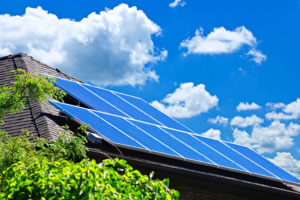 Most homeowners choose large companies, thinking they offer the best solar panel systems. However, that is not always the case since many local companies may offer the same options. Moreover, large companies offer very expensive options that many homeowners might not afford.
Most homeowners choose large companies, thinking they offer the best solar panel systems. However, that is not always the case since many local companies may offer the same options. Moreover, large companies offer very expensive options that many homeowners might not afford.
Along with looking for large companies, you must also check out the smaller ones in your locality. It will also help you understand whether or not you are making the right choice concerning the solar panel system.
You can save much money on panel installation with the right solar panel company.
Compare the Products
Along with comparing the companies, you need to compare the solar modules offered by the companies. You need to know about the equipment you will install on the roof. It is no secret that products from large companies will be of high quality and more expensive.
Sometimes, large companies can offer products unfavourable to the clients at a high price.
Hence, you can check the local companies’ product quality and price. If the companies offer a quality product reasonably, you can go for local companies. It will prevent you from buying products at inflated rates.
Check Company Reviews
The solar industry is gradually growing, which means there are new companies every day. Due to this increase in new companies, homeowners can become confused. It makes it hard to choose which company is best for them.
It might be hard to get real insights if you want to know about the company. The representatives of the company will only tell you good things.
To know about the company’s true condition, you need to check for third-party reviews. If you are opting for local installers, you can ask your neighbours or local people who may have used the equipment of the same company.
It would also be better to check if the company has any social media presence and reviews on Google, Yelp, etc.
Calculate Price Per Watt (PPW)
The price of a solar system depends on the price per watt (PPW). When you contact solar companies, you will be given quotes. However, there may be variations in the actual system size depending on the solar panels you use.
To calculate the price per watt (PPW), you need to use the formula –
Total System Cost / System Size in Watt
The metric KW measures the size of the solar system. You can find this by multiplying the system size of the panel by 1000.
Discover the Power of Solar with Solar Panels Network
Are you navigating the world of solar installations? Look no further than Solar Panels Network, the UK’s trusted partner in harnessing the sun’s potential. Our dedication goes beyond just installations; we’re on a mission to transform how homeowners and businesses across the UK perceive and utilise energy. By choosing us, you’re reducing your carbon footprint and making a smart financial move that promises savings for years ahead. Contact us today and embark on your solar journey.
Summing Up
Choosing the best solar panel system is not easy since there are multiple options in the market. You must ensure that you choose the right solar panel manufacturer that offers solar panels with the required efficiency rating.
The solar panel efficiency will also vary based on your roof space. Apart from this, you must also ensure that the solar panels are high quality.
When choosing solar panels, it would be best to look into your budget, solar cell lifespan, efficiency rating, and aesthetics. It would help you in the process of choosing efficient solar panels that are perfect for your house. You can save much money on your electricity bills with the right, efficient solar panels.
About the Author
Solar Panels Network stands at the forefront of solar energy solutions, driven by a team of seasoned solar engineers and energy consultants. With over decades of experience in delivering high-quality solar installations and maintenance, we are committed to promoting sustainable energy through customer-centric, tailored solutions. Our articles reflect this commitment, crafted collaboratively by experts to provide accurate, up-to-date insights into solar technology, ensuring our readers are well-informed and empowered in their solar energy decisions.

